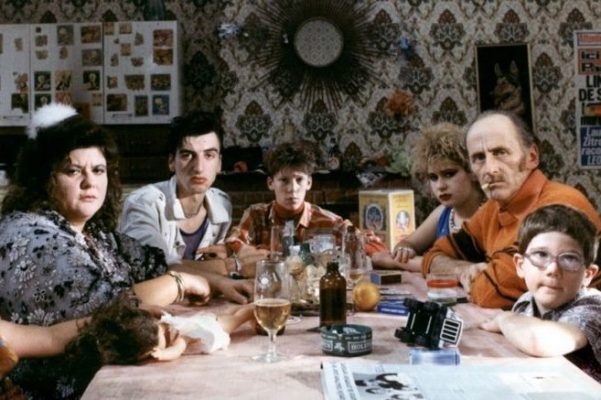A massive hit in France on its initial release, Life is a Long Quiet River‘s watchword is broad: broad comedy, broad satire, and broad sense of irony. From the moment a car explodes as the title appears on screen, we’re operating in a mode which see subtlety at a premium. Director Étienne Chatiliez’s family comedy resists turning class commentary into the full-on farce that seem to be its obvious rhythm. This leaves it somewhere in a trough between a sly statement on nature against nurture and the vaudevillian grotesquerie of some of its characters. Despite its popularity it never manages to bring its two competing instincts together coherently.
The film is the story of two families; the Le Quesnoys and the Groseilles who live on opposite sides of the tracks in a northern French town. Their lives would never have intersected were it not for the revelation that a disgruntled nurse had swapped two newborn babies over 12 years previously and each family had been raising a child belonging to the other. The lowly Groseille clan are happy to return their son Momo (Benoît Magimel) to his rightful home and allow Bernadette (Valérie Lalande) to remain with the wealthier family – in return for a healthy bribe.
This peculiar turn of events was set in motion by Josette (Catherine Hiegel), the long-time mistress of snooty obstetric gynaecologist Dr. Mavial (Daniel Gélin), a veteran practitioner whose wife is infirm and who takes poor Josette’s affections for granted. It was a snub from the doc that led to her swapping the children on the spur of the moment. When Mavial’s wife dies and he still refuses to acknowledge their relationship publicly, she breaks her silence. These scenes are the strongest of the film, which demonstrates the structural problems. Once the secret is out, the doctor’s career is wrecked and they vanish from the film. Popular critical wisdom has the story taking a little too long to kick into gear before it cranks into comedic life. However, the time taken in setting the scene is rather undone once the organised chaos kicks in and it becomes infinitely less satisfying as a viewing experience. It does, in mitigation, at least try and set itself apart from other social clash comedies.
Where Life is a Long Quiet River differs from other films dealing in class and manners is in the depiction of its central families. You may instinctively expect the balance of sympathy to tip in favour of the working-class, particularly for British viewers, who are used to the underdog being celebrated. However, the Groseilles are crass, slovenly, openly racist and immorally opportunistic. Even the most generous souls or militant class warriors would struggle to side with these cartoons. The Le Quesnoys, while comically fastidious and pious – like the Flanders family come to life – are generally kind-hearted and trying to do the right thing. The Le Quesnoy matriarch Marielle (Hélène Vincent) is perhaps the closest thing to a heroine the film contains, although Chatiliez delights in circumstances that result in the well-to-do dynasty reduced to tinned ravioli and huffing glue. This is not so much a liberation of the Le Quesnoy’s from their self-imposed social and spiritual constraints; rather it’s them being sucked into the quicksand of the Groseille’s squalor.
Chatiliez also becomes largely uninterested in Bernadette, who had been the Groseille cuckoo in the Le Quesnoy nest. Instead, it’s largely Momo’s story. Young Magimel is engaging enough, and there are some fun individual scenes. In particular, an impromptu swim in a canal by both sets of children finds the genuine humanity and a sense of childish camaraderie that transcends their circumstances. Sadly, it’s a rare moment of truth in a movie that too often finds its humour in the sight of young kids drunk or sniffing solvents from a bag.
It’s likely that Life is a Long Quiet River is successful purely because of its lack of nuance, and the appeal in the collision of opposing social and cultural extremes. It’s this broadness that unfortunately leaves the film with no genuine insight. Étienne Chatiliez seems to have forgotten the ‘lovable’ part of ‘lovable rogues’. You might come into the film expecting a Gallic spin on Carla Lane‘s Boswell family, but instead of a French Bread, it’s more like The Twits à la française.
Available on Blu-ray from Mon 20 Jul 2020
